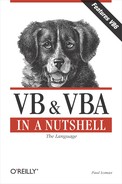| Filter Function (VB6) |
Named Arguments
No
Syntax
Filter(SourceArray, FilterString[, Switch[, Compare]])
SourceArray
Use: Required
Data Type: String or Variant
An array containing values to be filtered.
FilterString
Use: Required
Data Type: String
The string of characters to find in the source array.
Switch
Use: Optional
Data Type: Boolean
A Boolean (True or False) value. If True, the default value, Filter includes all matching values in result; if False, Filter excludes all matching values (or, to put it another way, includes all nonmatching values).
Compare
Use: Optional
Type: Constant of vbCompareMethod Enumeration
An optional constant (possible values are vbBinaryCompare, vbTextCompare, vbDatabaseCompare) that indicates the type of string comparison to use. The default value is vbBinaryCompare.
Return Value
A String array of the elements filtered from SourceArray.
Description
Produces an array of matching values from an array of source values that either match or don't match a given filter string. In other words, individual elements are copied from a source array to a target array if they either match or don't match a filter string.
Rules at a Glance
The default Switch value is True.
The default Compare value is vbBinaryCompare.
vbBinaryCompare is case sensitive; that is, Filter matches both character and case. In contrast, vbTextCompare is case insensitive, matching only character regardless of case.
The returned array is always base 0, regardless of any Option Base setting.
Programming Tips and Gotchas
The Filter function ignores zero-length strings ("") if SourceArray is a string array and ignores empty elements if SourceArray is a variant array.
The array you declare to assign the return value of Filter must be a dynamic, single-dimension String array or a variant.
Although the Filter function is primarily a string function, you can also filter numeric values. To do this, specify a SourceArray of type Variant and populate this array with numeric values. Although FilterString appears to be declared internally as a string parameter, a String, Variant, Long, or Integer can be passed to the function. Note, though, that the returned string contains string representations of the filtered numbers. For example:
Dim varSource As Variant, varResult As Variant Dim strMatch As String strMatch = CStr(2) varSource = Array(10, 20, 30, 21, 22, 32) varResult = Filter(varSource, strMatch, True, _ vbBinaryCompare)
In this case, the resulting array contains four elements: 20, 21, 22, and 32.
The Filter function is an ideal companion to the Dictionary object. The Dictionary object is a collection-like array of values, each of which is stored with a unique string key. The Keys method of the Dictionary object allows you to produce an array of these Key values, which you can then pass into the Filter function as a rapid method of filtering the members of your Dictionary, as the following example demonstrates.
Example
Dim i As Integer
Dim sKeys() As Variant
Dim sFiltered() As String
Dim sMatch As String
Dim blnSwitch As Boolean
Dim oDict As Dictionary
Set oDict = New Dictionary
oDict.Add "Microsoft", "One Microsoft Way"
oDict.Add "AnyMicro Inc", "31 Harbour Drive"
oDict.Add "Landbor Data", "The Plaza"
oDict.Add "Micron Co.", "999 Pleasant View"
sKeys = oDict.Keys
sMatch = "micro"
blnSwitch = True
'find all keys that contain the string "micro" - any case
sFiltered() = Filter(sKeys, sMatch, blnSwitch, _
vbTextCompare)
'now iterate through the resulting array
Debug.Print sFiltered(i)&","&_
oDictItem(sFiltered(i))
Set oSupplier = Nothing
Next i